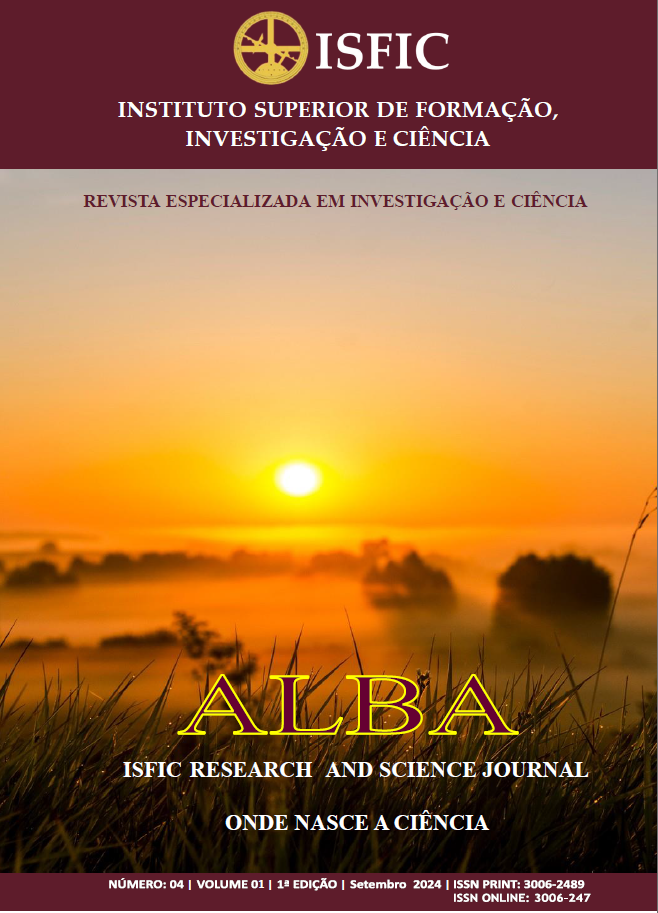Social inequality: The case of drought in southern Angola
Abstract
This article addresses social inequality. “The case of drought in southern Angola.” The southern provinces of Angola in particular (Cunene, Namibe and Huíla) have suffered the impacts of climate change. In periods of drought. We think it is a relevant problem as it has lasted for several decades. Making it more challenging year after year causing social inequality. Its objectives were: To learn about the vectors considered essential for contributing to the drought problem in the south of the country. As well as understanding social perceptions, with the possibility of presenting strategies to control the problem. This is a descriptive and exploratory study with a qualitative approach. Taking as a theoretical reference, Karl Marx's theory of social inequality and the doctrine of sufficiency of Henry Frankfort. The technique used was the in-depth interview. Sampling was non-probabilistic for convenience. The data was processed taking into account content analysis. The results show that: Bringing water and tons of food does not solve the situation. The need to materialize inclusive public policies, with structuring projects. In creating sustainable agriculture that integrates conservation. In land planning development due to global warming. Since Angola is located in an area of contrast. From Southern Africa. Which in recent times has deserved more attention both at the world and continent level due to extreme issues. Furthermore, the country must participate in international efforts to mitigate climate change. Starting with action research and subsequently evaluating the results of the implemented plans. This is how we see the future.
Downloads
References
Bembe, Miguel Domingos. (2016). Os grandes desafios dos governos africanos para o século XXI. Revista angolana de ciências sociais. Luanda: pp.2. https://doi.org/10.4000/mulemba.805.
Birminham, Id. (2017). Breve história de Angola Moderna (Séc. XIX-XXI) Lisboa: pp.145.
Carvalho, Paulo de (2002). Angola quanto tempo falta para amanhã? Reflexões sobre as crises políticas, económica e social. Oeiras: Celta editora.
Carvalho, Paulo de. (2008). Estado Nação e Etnia em Angola. Revista Angolana de Sociologia, n1, pp.61-71.
Carvalho, Paulo de. (2004). Dimensão subjectiva de pobreza na cidade deLuanda.VIII congresso Luso-Afro-Brasileiro de Ciências Sociaiscoimbra,Portugal: pp.1.
Ceast, II (2004) Semana Social Nacional. O cidadão e a política. Centro cultural mosaico. Luanda.
Dahl, Robert. (2005). Poliarquia. Quando a democracia houve e pensa. São Paulo: Edusp.pp.1. https://periodicos.set.edu.br/
Dye, Thomas. (1984) D. Understanding Public Policy. Englewood Cliffs, N.J: Prentice-Hall.
Evaristo, António. (2018) Obstáculos socioeconómicos ao desenvolvimento das PME´s em Angola. Narrativa editores: Lisboa.
Enoque, Matos. (2013), O papel da sociedade no comprimento da missão da escola. Luanda: Olohengo.
Frankfurt, G. Henrry. (2015). Sobre a desigualdade. Brasil: Gradiva.pp.77
Instituto nacional de estatística (2020) pobreza multidisciplinar em Angola. Luanda: Disponível em www.ine.gov.ao.
Mateus, Nelson Pedro António. (2020) Seca no sul de angola:uma avaliação do episodio extremo de 2028/2019 pp.1-2.
Morena, Zola. (2023). Desemprego em Luanda: Um problema social á luz da realidade angolana. Revista Unikivi. Vol. o1, n-1, pp 1-12. https://ciencia.unikivi.ao/-!/index.php/ciencia.
Kajibanga, Victor. (2010) Culturas étnicas e cultura nacional: Uma reflexão sociológica sobre o caso Angolano. Revista Angolana de sociologia. pp.5.
Sampiere, robert Hernanes; COLLADO,Carlos Fernandes;LUCIO, Maria de Pilar Baptista. (2013) Metodologia de pesquisa. 5ªediçao.São Paulo: Penso.
Sen, A. (2010) Desenvolvimento com liberdade. Tradução: Laura Teixeira Motta. São Paulo: Companhia das lectras.
Simões, Anibal. (2015) Representações sociais sobre a inclusão social dos jovens angolanos residentes em Luanda: pp.4 https://journal.openedition.org/mulemba7383.
Simões, Anibal. (2016) Metodologia de investigão científica: Investigação qualitativa. Luanda: Mayamba.
Zau, Filipe. (2013) Educação em Angola. Novos trilhos para o desenvolvimento. Lisboa, universidade aberta.
Sites da internet
https://m.youtube.com/ Watch?v=zixl5f4izc
https://www.google.com/search?source=androidbrowser&q=Diversifica%C3%A7%C%A3%20Da%20Economia%20
https://amp.dw.com/pt-002/como-combate-a-seca-no sul-de angola/a-61478529
https://www.educamaisbrasil,com.br.
https://www.google.com/search?source=android browser&q=pobresa%paulo%20De%20Carvalho%20.
https://www.unicef.org/angola/historias/cavar-para-sobreviver-como-pessoas- enfrentam-seca-no-cunene.







